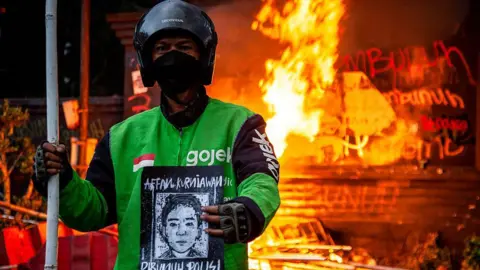Protesters have been killed, buildings torched and politicians' houses looted as anti-government unrest spreads across Indonesia - and the authorities respond with force.
Mass demonstrations, fuelled by cost-of-living woes and public frustration with the political elite, first erupted in Jakarta on 25 August to condemn what many viewed as excessive pay and housing allowances for parliamentarians.
By the end of the week, things had boiled over into violence. On Thursday night, following escalating clashes between demonstrators and authorities, police in Jakarta ran over and killed 21-year-old motorcycle rideshare driver Affan Kurniawan.
President Prabowo Subianto and the chief of police apologised for his death - but it fuelled further discontent that has now spread to various corners of the archipelago, from West Java to the islands of Bali and Lombok.
At least seven people had died in the protests by Monday, according to Indonesia's co-ordinating minister for economic affairs.
The perks that sparked a protest
The primary trigger for the protests was the Indonesian government's decision to raise the allowance for national parliamentarians.
Local media last month reported that they were paid upwards of 100 million rupiah (£4,499; $6,150) a month - more than 30 times the average national income - including a substantial housing allowance.
Meanwhile, everyday Indonesians were struggling because of a cost-of-living crisis.
As the government is undertaking austerity measures, and at a time when citizens are feeling economically insecure, the notion that Indonesia's already wealthy political class would see their incomes rise filled people with rage, and they spilled onto the streets to express that rage, Dr Eve Warburton, director of the Indonesia Institute at the Australian National University, told the BBC.
These protests spiralled after Affan's death, and have since grown to encompass issues of police brutality and accountability.

Political corruption, social inequality, and economic challenges continue to drive public anger. In response to the unrest, President Prabowo announced the scaling back of politicians' perks, which protesters welcomed as a positive step. However, many feel it does not address the deeper systemic issues affecting ordinary citizens.
The crackdown
As discontent spreads, Prabowo also instructed military and police to act more vigorously against rioters and looters amid escalating violence, including the torching of legislative buildings.
TikTok has temporarily halted live streaming to prevent possible mobilization of protestors online.
An opportunity for change
The current unrest marks a significant challenge for President Prabowo, necessitating a delicate balance between meeting protestor demands and ensuring state safety. The depth of grievances displayed in these protests may catalyze meaningful governmental reforms if leaders heed the people's call for accountability and transparency.



















